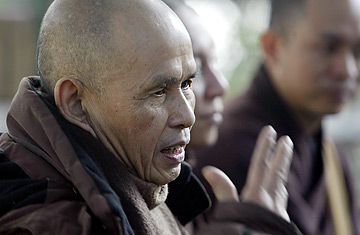
 HANOI, Vietnam -- As a world-renowned Buddhist scholar, Vietnamese monk Thich Nhat Hanh has become almost synonymous with the words reconciliation and healing. Exiled by both North and South in the 1960s, he focused his concepts of mindfulness and "engaged Buddhism" into retreats for American veterans struggling to build inner peace from the ravages of the Vietnam War.
HANOI, Vietnam -- As a world-renowned Buddhist scholar, Vietnamese monk Thich Nhat Hanh has become almost synonymous with the words reconciliation and healing. Exiled by both North and South in the 1960s, he focused his concepts of mindfulness and "engaged Buddhism" into retreats for American veterans struggling to build inner peace from the ravages of the Vietnam War.
He's published more than 80 books, built monasteries in France and the U.S. and was nominated for a Nobel Peace Prize by Martin Luther King Jr., who said his anti-war stance was inspired by the Zen master's teachings.
One dedicated doctor keeps a nightly vigil in a violent section of the city. But how much longer will he and other physicians remain in an increasingly dangerous country?
Now, at age 80, Nhat Hanh has turned his attention to healing the wounds of war in his communist-run native land. But his mission faces opposition from a surprising front — fellow Vietnamese Buddhists. Last week, Nhat Hanh arrived in the former Saigon for a 10-week tour, his second in two years. His plans include a series of three-day Buddhist mass-chanting ceremonies, the first starting March 16, to pray for the dead on all sides of the Vietnam War, unprecedented "Grand Requiem" ceremonies that Nhat Hanh's followers hail as a leap forward in Communist-Buddhist relations.
But the banned Unified Buddhist Church of Vietnam sees Nhat Hanh's pilgrimage as betrayal, not breakthrough. The UBCV's two top officials, Thich Huyen Quang, and Thich Quang Do ("Thich" is an honorific held by most Vietnamese monks) have been under house arrest in their respective monasteries due to their pro-democracy stance and opposition to strict government control of religion, which was established after the communists won the war in 1975. A spokesman for the outlawed sect said he is "shocked" that Nhat Hanh is willing to work with his co-religionists' oppressors. "I believe Thich Nhat Hanh's trip is manipulated by the Hanoi government to hide its repression of the Unified Buddhist Church and create a false impression of religious freedom in Vietnam," said Vo Van Ai, a Paris-based spokesman for the UBCV.
About the Requiem plans, Ai said pointedly, "I think it is time to think about the living, not only the dead."
The controversy pits Vietnam's best-known Buddhists against each other. The Unified Buddhists' patriarch, 87-year-old Thich Huyen Quang, who lives in a monastery in central Vietnam, has been ailing recently, but his deputy, Thich Quang Do, 77, has been a high-profile dissident operating out a monastery in Ho Chi Minh City (formerly Saigon) and proponent of Buddhism free of state control. (An estimated 80% of Vietnam's 84 million people are Buddhist, but after the Vietnam war the Communist Party folded the religion's many sects into one state-controlled church.) Quang Do smuggled his messages to his supporters in Paris who then channel the word back to Vietnam. He has been nominated for the Nobel Peace Prize several times.
Despite the sequestration of the dissident Buddhists, Hanoi's communist leaders have been working hard to dispel the country's reputation for persecuting religion. After the U.S. in 2004 placed Vietnam on its list of "Countries of Particular Concern" for blocking religious freedom (North Korea, Iran, Saudi Arabia and China are all on the list), Hanoi passed a new law outlining ways for non-state religions to gain official approval. The next year, it allowed Nhat Hanh to return to Vietnam for the first time in 40 years. Late last year, Washington removed Vietnam from the religious-freedom blacklist.
The Unified Buddhists say the Communist Party's strategy is to promote Nhat Hanh's non-political teachings in order to sideline the religion's leg